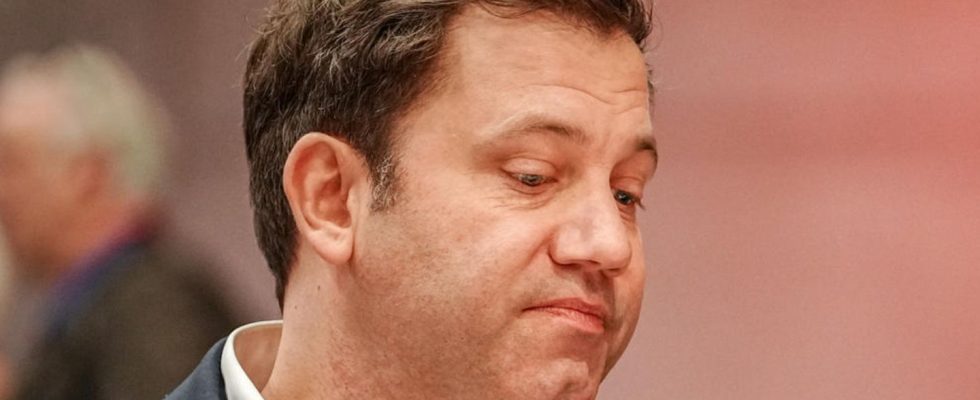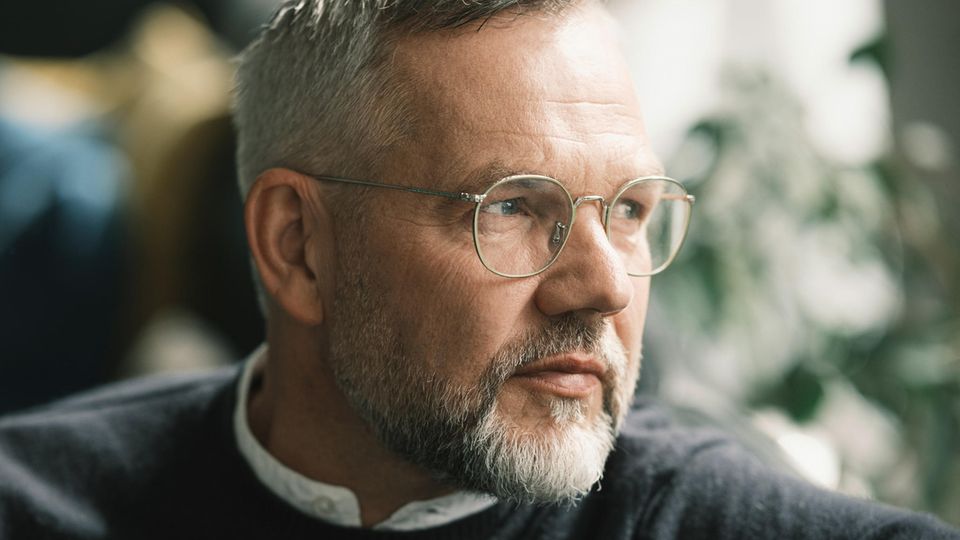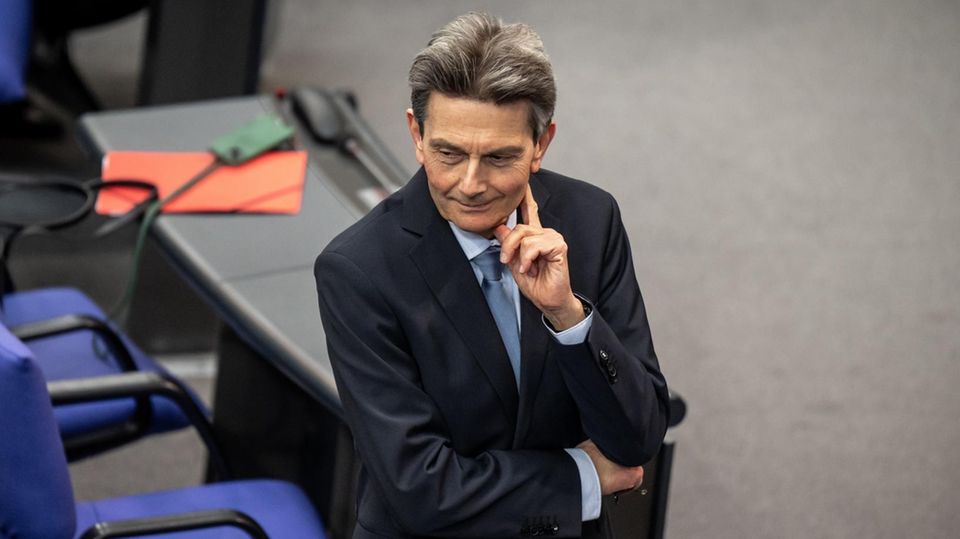Others dominate Russia policy, and his substantive emphasis falls flat. What’s wrong with SPD leader Lars Klingbeil?
Recently in Berlin. The Seeheimer Kreis celebrates its 50th anniversary in the chic Allianz Forum at the Brandenburg Gate. There is popcorn, the Chancellor and a combative birthday greeting from the party chairman. “We don’t make ourselves small as a social democracy,” shouts Lars Klingbeil from the stage, “we are proud of what we have achieved.”
Klingbeil is self-confident – and friendly. He brought a cake for his anniversary. These days it seems as if he is getting a slap in the face from his comrades.
A few examples: When it comes to Russia policy, his attempt to correct course is quickly turned into the opposite. Deserved Social Democrats are leaving politics, feeling abandoned by the SPD. Content-related impulses are lost – like Klingbeil’s plans for economic recovery. Didn’t notice or already forgot? Exactly.
Of course, Klingbeil is not alone at the head of the SPD, Saskia Esken is also there. But he has the greater ambition to reposition the party and hold the place together. That’s why he is now in focus. Little has changed in the SPD’s situation at the moment: the Chancellor is unpopular, the party is nervous – for Lars Klingbeil things are going so-so. What’s going on there?
Lars Klingbeil and the both/and strategy
It was Klingbeil who ordered his party to make a drastic course correction after the Russian invasion of Ukraine. Certainly also to shake off the reputation of being an incorrigible appeasement party. Germany must have the right to be a “leading power,” the party leader concluded in the summer of 2022, now security must be a priority before and not with He called for Russia to be organized a few months later. Clear announcements that shook the principles of the comrades that had been in force until then and also provoked contradiction. He thought that was good. Klingbeil considered it necessary to examine Russia policy.
But the price swing has not proven to be particularly sustainable. Rolf Mützenich, the SPD parliamentary group leader, countered the attempted change in mentality with a remarkable consideration. “Isn’t it time,” Mützenich asked recently in the Bundestag, “that we not only talk about how to fight a war, but also think about how we can freeze a war and end it later? Isn’t it possible politically too about these questions?”
The apparently well-placed emphasis on peace caused the coalition partners to shake their heads, but sparked enthusiasm among the Social Democrats. Many of them perceive Mützenich’s new sound as a kind of liberation – less the tone of the party chairman. The SPD, the old new peace party. In solidarity with Ukraine, but also thinking beyond the day. End of the war, freezing of the front. Peace, perhaps.
Klingbeil’s answer: A triad that is supposed to somehow appeal to everyone – and yet lacks one thing: clarity. Russia must disappear from the occupied territories, Ukraine must be given comprehensive and long-term support, but a debate about peace scenarios must also be possible. This is what Klingbeil said, roughly summarized: now the editorial network Germany.
It’s a both/and strategy with which Klingbeil will hardly be able to put an end to the heated debate that is currently overshadowing everything. And with which he gives the impression as if the peace mantra had been forced on him too.
Mützenich counteracts the party leader’s course
Maybe that’s Klingbeil’s problem: He wanted to correct course in Russia policy, but not restrict the Chancellor. So he has been formulating his view in a more measured way for the past two years. Now, in the crisis, some have the impression that the SPD is disappearing behind the Chancellery. Mützenich encountered this feeling. This is also why his accent may have shaken up his comrades so much.
This has collateral damage for Klingbeil. Just one day after Mützenich’s ten-minute maneuver in parliament, the party executive met for a two-day closed meeting. Among other things, a ten-point plan for the economy was decided. But what was intended to be a big boost from the boss, which would also position the party for the federal election, was hardly noticed by the general public. The new Ukraine sound made the big headlines.
The question of war and peace has caused a new hardship in the SPD – says someone who should know. Michael Roth, chairman of the Foreign Affairs Committee, has distanced himself from his party. Or her from him? “Not everyone liked my early commitment to Ukraine,” he now says in general star-Conversation. He became more and more unfamiliar with the party meetings, a frosty atmosphere. “Sometimes I felt like a foreign body,” says Roth. The long-time MP no longer wants to run for the next federal election.
“It all depends on the Chancellor”
This means that the party is not only losing a high-profile foreign policy expert, but also co-leader Klingbeil, someone who was similar to him when it comes to Russia policy. Roth was never suspected of wanting to accommodate the Kremlin even a millimeter. Quite the opposite. Perhaps that is why he was not re-elected to the SPD executive board at the party conference in December and was punished by his comrades. Now he’s calling it quits – obviously also because he has become alienated from the SPD and its dealings with the Chancellor. “Both the party and the parliamentary group have effectively subordinated themselves to him. Everything depends on the chancellor,” criticizes Roth.
Attempts are being made to downplay Roth’s statements in the party leadership as an uncomfortable individual opinion. However: Boris Pistorius, the Defense Minister, also makes it clear that he doesn’t have much to gain from the idea of ”freezing” the war. And well-known historians who are themselves SPD members are suddenly distancing themselves. Your unusually sharp criticism is of course also addressed to Klingbeil. He’s the boss.
In a letter to the party executive, the Eastern European scientists accuse the SPD leadership of denying reality in connection with the Russian war of aggression against Ukraine. In particular, the most recent statements by SPD parliamentary group leader Mützenich were “fatal”, “Table.Briefings” quotes from the letter and said they would “actually mean an end in favor of the attacker”. The key sentence, for Klingbeil: The SPD lacks an “honest examination of the mistakes in Russia policy of the last decades.”
What the historians are writing can actually only be understood like this: the co-boss’ mission failed.



